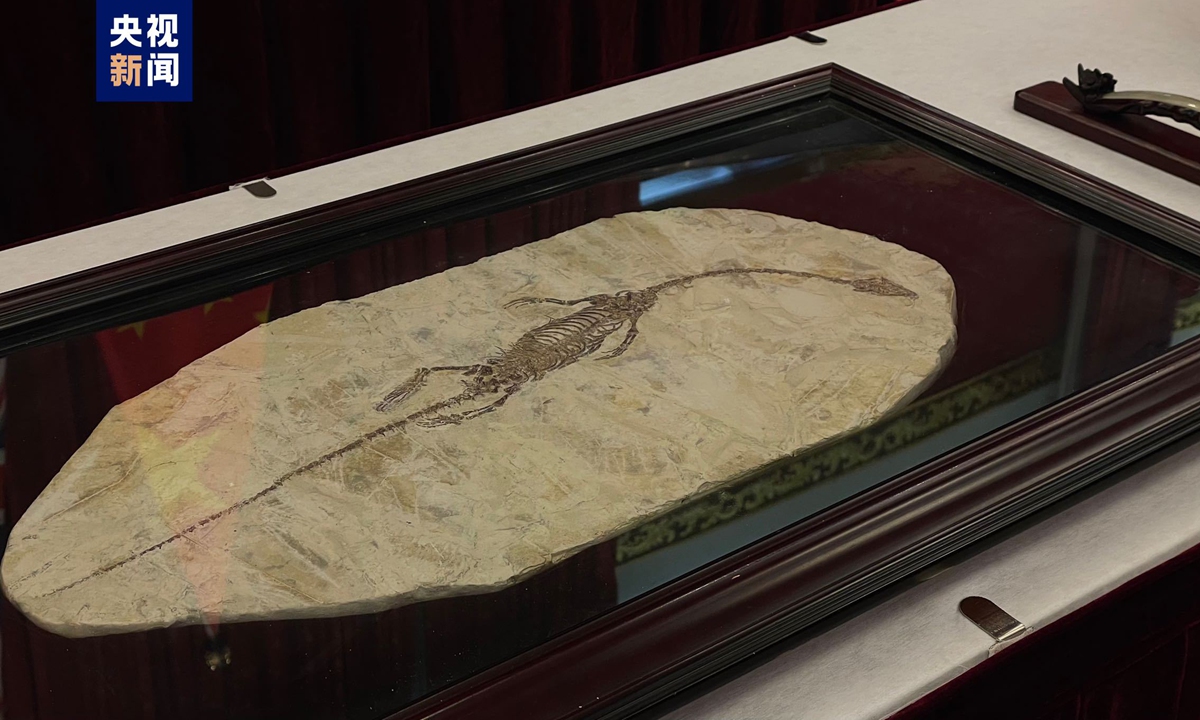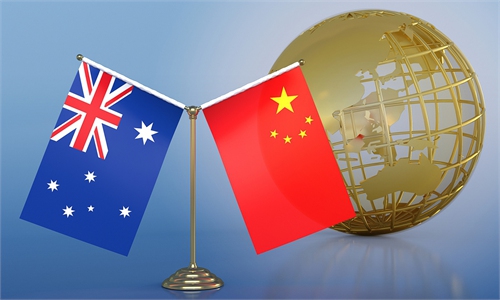Australia repatriates several Chinese cultural relics ahead of PM Albanese’s visit

Plesiosaur fossil Photo:CCTV
Australia repatriated four cultural relics and artworks and one paleontological fossil lost overseas to China on Wednesday, demonstrating the shared commitment of the Chinese and Australian governments to protect cultural heritage and providing a clear example of the connection between the peoples of the two countries, Chinese officials said.
The return of these cultural relics took place ahead of a planned visit by Australian Prime Minister Anthony Albanese to China, which, in the eye of Chinese experts, reveals Canberra's goodwill in enhancing not only the bilateral relations but also people-to-people and cultural ties.
The returned cultural relics, artworks, and paleontological fossil have significant historical, artistic, and scientific value, according to China's National Cultural Heritage Administration.
Among them, a painted pottery figure of a person on horseback from the Northern Dynasties (386-581) to the Tang Dynasty (618-907), a gilded bronze Buddha statue from the late Sui (581-618) to the Tang Dynasty, and an ichthyosaur fossil from the late Jurassic to early Cretaceous period were all intercepted by the Australian government's arts office on cultural property, collectibles, and antiquities at customs upon entry, the administration said.
Since November 2020, the National Cultural Heritage Administration, in conjunction with China's Ministry of Natural Resources, has closely cooperated with the Chinese Embassy in Australia.
With the cooperation of the Australian arts office, efforts were made to retrieve and repatriate suspected illegally imported cultural relics and artworks, as well as paleontological fossils, which, in the end, successfully facilitated their return.
The Australian National Art Gallery also donated a bovine-shaped vessel, known as "Xi Zun," dating from the Ming (1368-1644) and Qing Dynasties (1644-1911), while an Australian private citizen donated a Qing Dynasty hairpin to the Chinese government.
It also marked the first time an Australian gallery has returned cultural artifacts to China in the more than 50 years since the two countries established diplomatic relations in 1972.
The return of these cultural relics to the motherland demonstrates the shared commitment of the Chinese and Australian governments to protect cultural heritage, Chinese Ambassador Xiao Qian said at the returning event.
The return marked a grand occasion for bilateral cultural heritage exchanges and is a testament to the friendly cooperation between the two sides, Xiao said.
"China and Australia signed a Memorandum of Understanding on cultural relics protection in 2009. Subsequently, Australia returned a relic to China in 2015. Now, Australia has once again returned four lost cultural artifacts and one ancient fossil to China, for which we express our appreciation," Chinese Foreign Ministry spokesperson Mao Ning said at a press conference on Wednesday.
This is another successful collaboration between China and Australia in the field of cultural heritage protection and the repatriation of lost artifacts, and it is also a clear example of the deep connection between the hearts of the people of both countries, Mao said.
It also marked the second time that Australia has returned cultural artifacts to China since 2015, when the country returned a Qing Dynasty Guanyin statue, the administration said.
Currently, some museums and overseas institutions are returning lost Chinese artifacts. The British Museum, for instance, has heard the voices of the Chinese public calling for the return of Chinese relics, and in this context, Australia's friendly gesture is laudable, Chen Hong, director of the Australian Studies Centre of East China Normal University, told the Global Times on Wednesday.
"Recently, China-Australia relations have been steadily improving with some trade-related issues either being resolved or having been addressed. Australia taking such a proactive step aligns well with the broader positive atmosphere," Chen said, noting that the return taking place ahead of Albanese's visit shows goodwill.
Albanese will visit China from November 4 to 7, the Australian government announced on Sunday. The trip will make him the first Australian prime minister to visit China in seven years.
Australia itself was colonized by Britain. For such a country, which has its own colonial history, to recognize and empathize with China's situation in this context is indeed noteworthy, Chen said.
"Such goodwill will help enhance people-to-people ties and exchanges, and the two sides may explore more cooperation opportunities in cultural exchanges," he added.


